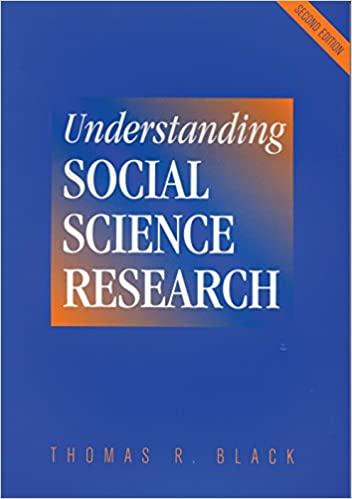Answered step by step
Verified Expert Solution
Question
1 Approved Answer
QUESTION 1 Which of the following is NOT one of the methods for acquiring knowledge? Intuition Authority Rationalism Behaviorism QUESTION 2 What are the






QUESTION 1 Which of the following is NOT one of the methods for acquiring knowledge? Intuition Authority Rationalism Behaviorism QUESTION 2 What are the three fundamental features of science? Systematic empiricism Empirical questions Public knowledge Intuition QUESTION 3 Liza is conducting research and she is interested in determining the causes of behavior. What goal of science is she working toward? To describe To predict To explain None of the answers QUESTION 4 Abraham is interested in the effect of cell phone use on driving could produce new insights into basic processes of perceptions, attention, and action. What type of research is she planning to conduct? Basic research Applied research QUESTION 5 Allana is struggling with interpreting the results of her research. She keeps focusing on information that confirms her own intuitive beliefs and not cases that disconfirm them. What is this an example of? 000 Heuristics Confirmation bias Skepticism Tolerance for uncertainty QUESTION 6 What is the commonly and widely kwnon application of psychology? Experimental Psychology Developmental Psychology Clinical Psychology Cognitive Psychology QUESTION 7 It is important for clinicians who never conduct a scientific study themselves to be scientifically literature so that they can read and evaluate new research and make treatment decisions based on the best available evidence. True False QUESTION 8 Good research must begin with a good research question. True False QUESTION 9 What is the most common inspiration for new research ideas? Practical problems Practical problems The internet Previous research QUESTION 10 Reviewing the literature early in the research process can help you in several other ways, including: It can tell you if a research question has already been answered. It can help you evaluate the interestingness of a research question. It can give you ideas for how to conduct your own study. It can tell you how your study fits into the research literature. QUESTION 11 Most articles in professional journals are one of two basic types: empirical research reports and review articles. True False QUESTION 12 When a review article provides a statistical summary of all of the previous results it is referred to as a non-empirical research reports review articles meta-analysis theoretical article QUESTION 13 Two criteria for evaluating research questions: the interestingness of the question and the feasibility of answering it. True False QUESTION 14 is a specific prediction about a new phenomenon that should be observed if a particular theory is accurate. Hypothesis Theory Testing Hypothetico-deductive QUESTION 15 A researcher might measure the talkativeness of a few hundred university students with the intention of drawing conclusions about the talkativeness of men and women in general. The few hundred university students is referred to as a: population sample Osimple random sampling O none of the answers QUESTION 16 In the Milgram experiment, the "participant" was a confederate. True False QUESTION 17 Though the participants in the Tuskegee Syphilis study agreed to participate in the study, they were not told that they had syphilis but would be denied treatment for it. Such an issues is a violation of: Autonomy Informed consent Confidentiality Anonymity QUESTION 18 is a set of 10 principles written in 1947 in conjunction with the trials of Nazi physicians accused of shockingly cruel research on concentration camp prisoners during World War II. Nuremberg Code Declaration of Helsinki Belmont Report Milgram Research Report QUESTION 19 The federal regulations distinguish research that poses three levels of risks, including: Exempt research Expedited research Greater than minimal risk research Office of Human Subjects Research at the National Institutes of Health QUESTION 20 in psychological rsearch can take a variety of forms, including misinforming participants about the purpose of a study, using confederates, using phony equipment like Milgram's shock generator, and presenting participants with false feedback about their performance (e.g., telling them they did poorly on a test when they actually did well). Informed consent 0000 Deception Debriefing Plagiarism
Step by Step Solution
There are 3 Steps involved in it
Step: 1

Get Instant Access to Expert-Tailored Solutions
See step-by-step solutions with expert insights and AI powered tools for academic success
Step: 2

Step: 3

Ace Your Homework with AI
Get the answers you need in no time with our AI-driven, step-by-step assistance
Get Started


